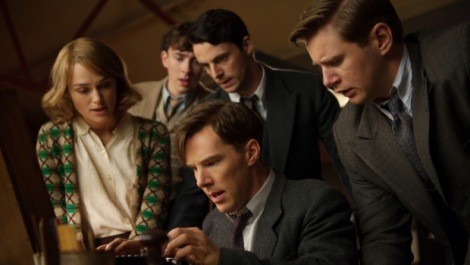Why you can trust GamesRadar+
With a title like The Imitation Game , you’d be forgiven for expecting a contemporary CIA thriller – rather than a carefully constructed character study of one of WW2’s largely unsung heroes. It’s centred on Alan Turing, the man responsible for cracking the Nazis’ Enigma cipher, thus helping end the war. Enemy dispatches, however, are not the only guarded secrets.
Bletchley Park’s efforts to outthink the Germans’ most cunning device has been covered before in Michael Apted’s Enigma (2001), where Dougray Scott played a vague approximation of Turing. But this digs far deeper. Adapted by first-time screenwriter Graham Moore from the book Alan Turing: The Enigma by Andrew Hodges, the story begins in 1952, several years after Turing’s moment of triumph, when the police (led by Rory Kinnear) investigate a suspicious break-in at his house.
Benedict Cumberbatch swiftly and compellingly differentiates Turing from his other ‘genius’ roles – Stephen Hawking, Sherlock – though the latter flashes through when the narrative winds back to 1939, as Turing enters Bletchley for the first time. Arrogant and assured, he’s also uncompromising and unpopular, divorced from the Matthew Goode-led codebreaking team.
When Turing demands to be put in charge, even petitioning PM Winston Churchill, it seems never in doubt that he’ll solve the riddle of the Enigma machine, a device that changes its settings every 24 hours to make detecting coding patterns nigh-on impossible. But this achievement, aided by Keira Knightley’s crossword-fanatic Joan Clarke and under the watchful eye of Mark Strong’s MI6 operative, is only part of The Imitation Game , which takes a darker turn with revelations that Turing is gay.
The result is less a portrait of WW2 innovation than it is of a man drowning in secrets at a time when homosexuality was illegal. He even asks for Joan’s hand in marriage – but theirs was always more friendship than frisson. Given the frequent shots of Turing in training (he was also a marathon enthusiast), you’re left to wonder if he’s running from himself – or public censure.
Director Morten Tyldum ( Headhunters ), essays the same attention to detail that fellow Scandinavian Tomas Alfredson brought to Tinker Tailor Soldier Spy . If The Imitation Game doesn’t emulate that film’s dazzling direction, it equally captures the texture of past British life and features a similarly exemplary Cumberbatch-inclusive ensemble. Only this time, he leads from the front, pouring body and soul into Turing. Cracking, you might say.
A finely etched character study, with Cumberbatch on towering form. Set coordinates for the Oscars.
James Mottram is a freelance film journalist, author of books that dive deep into films like Die Hard and Tenet, and a regular guest on the Total Film podcast. You'll find his writings on GamesRadar+ and Total Film, and in newspapers and magazines from across the world like The Times, The Independent, The i, Metro, The National, Marie Claire, and MindFood.



